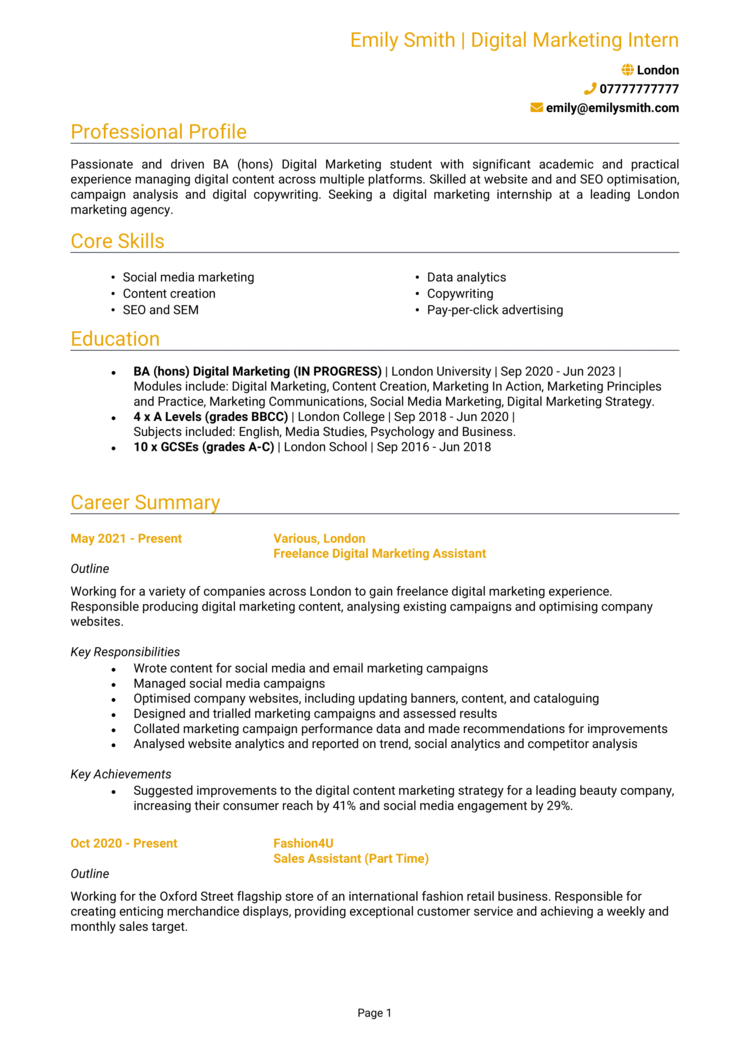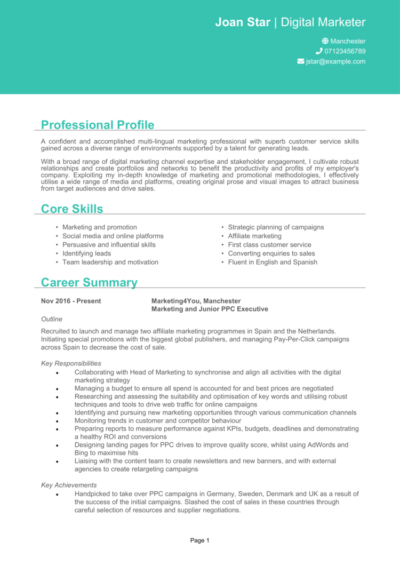SEO, PPC, content strategy – digital marketing is all about grabbing attention and driving results. But if your CV doesn’t do the same, recruiters might just bounce faster than a visitor on a slow-loading webpage
This guide and its Digital Marketing CV examples will help you create a CV that highlights your digital expertise, showcases your past success, and proves that you’re the marketer they need to boost their brand.
Digital Marketing CV

Digital Marketing Executive CV

Digital Marketing Intern CV

Content Marketing Manager CV

SEO Executive CV

Entry Level Digital Marketing CV

How to write your Digital Marketing CV
Learn how to create your own interview-winning Digital Marketing CV with this simple step-by-step guide.
Think of your CV as a marketing campaign for your personal brand. If it doesn’t convert, you won’t get the job: this guide will cover everything you need to know about writing a CV that highlights your top digital marketing skills and achievements. By the end, your CV will be fully optimised to get maximum clicks (and interviews).
Structuring your Digital Marketing CV


Your CV is your very own landing page – your key information needs to be structured in a way that keeps recruiters engaged. Don’t make them dig around for the good stuff: a coherent and clear layout will help busy recruiters easily find what they’re looking for.
Here’s how to structure your CV for easy navigation:
- Name and contact details – These personal details at the top to provide easy access for prospective employers. A picture of yourself generally isn’t expected for these roles.
- Profile – Hook the recruiter right away by stating the value you’ll bring their company, through your campaign success and analytical skills.
- Core skills – State your best qualities at a quick glance, from SEO and content marketing to data analytics and PPC.
- Work experience – List your previous job titles from newest to oldest, focusing on key results and achievements.
- Education – Show off your academic record and qualifications, like degrees and digital marketing certifications.
- Additional info – Include anything from your hobbies and interests to the languages you speak and awards you’ve earned – these are all totally optional.
The best way to format your Digital Marketing CV


Time for the UX part of your CV: a visually-appealing format will make reading your CV as easy and as pleasant an experience as possible. Keep your layout clean, professional, and easy to scan, free from avoidable formatting mistakes that’ll cost even the best candidates the job.
Follow these formatting principles:
- Bullet points – Use short, sharp bullet points to present your responsibilities and achievements clearly.
- Divide sections – Make use of distinct headings and logical spacing to guide recruiters through your CV.
- Use a clear and readable font – A simple, professional font ensures readability while keeping the layout polished and tidy.
- No more than 2 pages – Keep it lean while highlighting your biggest wins. If you need more length than this, consider a separate cover letter.
Digital Marketing CV profile


Your CV profile should be as compelling as a great ad campaign – results-focused and straight to the point. This is your chance to hook recruiters and show why you’re the ideal digital marketer for the job, in just a few short lines.
Digital Marketing CV profile examples
Profile 1
Results-driven Digital Marketing Specialist with four years of experience in SEO, PPC, and social media management. Skilled in developing and executing data-driven marketing campaigns to drive traffic, engagement, and conversions. Proficient in Google Ads, Facebook Ads Manager, and Google Analytics. Passionate about leveraging digital tools to enhance brand visibility and customer acquisition.
Profile 2
Creative Digital Marketing Executive with three years of experience managing content marketing, email campaigns, and social media strategies. Adept at using SEO techniques, paid advertising, and A/B testing to optimise marketing performance. Skilled in tools such as SEMrush, Mailchimp, and HubSpot. Committed to driving brand awareness and delivering measurable marketing results.
Profile 3
Experienced Digital Marketing Manager with over six years of expertise in multi-channel campaigns, lead generation, and brand positioning. Skilled in developing strategic content, managing online advertising budgets, and analysing performance metrics. Proficient in CRM tools, conversion rate optimisation (CRO), and marketing automation. Dedicated to maximising ROI through innovative and targeted digital strategies.
What to include in your Digital Marketing CV profile
Here’s some tips on what to include:
- Your specialisation – Are you an expert in SEO, paid ads, email marketing, or social media strategy?
- Your impact – Have you boosted engagement, increased website traffic, or improved ROI? Show it.
- Your data-driven approach – Employers love marketers who can combine creativity with analytics.
- Industry experience – Whether you’ve worked in B2B, e-commerce, or agency settings, make it clear.
- Tools and platforms – Mention any expertise in platforms like Google Ads, Meta Business Suite, or marketing automation tools.
How to present your core skills properly


This section is like keyword research – only the most relevant skills should make the cut. Show recruiters your key strengths at a glance. Focus on hard skills, mentioning the specific abilities a recruiter would hope for from their new employee.
Digital marketing roles vary widely, so tailor your CV skills to best match the job description. For example, if the role is focused on performance marketing, highlight expertise in paid media and analytics. If it’s content-heavy, focus on SEO, copywriting, and engagement strategies.
Top skills for your Digital Marketing CV
- SEO and SEM Management – Optimising content for search engines and managing paid search campaigns to increase online visibility.
- Content Marketing – Creating and distributing valuable content, including blogs, videos, and infographics, to engage audiences.
- Social Media Strategy – Planning, scheduling, and managing campaigns across platforms like Facebook, LinkedIn, and Instagram.
- Email Marketing – Designing and executing targeted email campaigns to nurture leads and retain customers.
- PPC Advertising – Running and optimising paid campaigns on Google Ads, Facebook Ads, and other platforms to drive conversions.
- Web Analytics and Data Interpretation – Using tools like Google Analytics and Hotjar to measure performance and inform marketing decisions.
- Marketing Automation – Implementing automation tools like HubSpot or Mailchimp to streamline workflows and enhance customer engagement.
- Conversion Rate Optimisation (CRO) – A/B testing and refining landing pages, CTAs, and user journeys to improve conversion rates.
- Influencer and Affiliate Marketing – Collaborating with influencers and partners to expand brand reach and credibility.
- E-commerce Marketing – Implementing strategies to increase online sales, including product listing optimisation and retargeting campaigns.
Outlining your work experience


Anyone can say they ‘know SEO’ – but can you prove you’ve used it to drive real results? Your work experience section proves your ability to create successful campaigns, optimise performance, and generate real results.
Start with your most recent role and work backwards, structuring each entry with bullet points to highlight your key contributions. If you don’t have direct digital marketing experience, focus on transferable skills from roles in sales, PR, or content creation.
How to structure jobs

- Outline – Introduce the company, your role, and the type of digital marketing work you were responsible for.
- Responsibilities – List your main tasks, such as campaign execution, content strategy, or customer engagement. Use action words like “optimised”, “executed”, and “analysed”.
- Achievements – Highlight measurable outcomes, such as increased website traffic, improved ad conversion rates, or lead generation growth. Actual numbers serve as great evidence of your impact.
Example jobs for Digital Marketing
Digital Marketing Executive | Brightwave Media
Outline
Managed digital marketing campaigns across multiple channels within a digital marketing agency, focusing on driving brand awareness and customer engagement for a diverse client portfolio.
Responsibilities
- Developed and scheduled social media content to enhance online presence.
- Optimised website content using SEO best practices to improve search rankings.
- Managed Google Ads and social media ad campaigns to maximise ROI.
- Tracked campaign performance using Google Analytics and adjusted strategies accordingly.
- Created email marketing campaigns and analysed engagement metrics.
Achievements
- Increased website traffic by 40 percent through improved SEO and content marketing.
- Boosted lead generation by 25 percent through targeted social media campaigns.
- Achieved a 15 percent increase in email open rates by refining subject lines and content strategy.
SEO Specialist | NextGen Digital Solutions
Outline
Developed and implemented SEO and paid advertising strategies within an e-commerce company, increasing website visibility and improving conversion rates through data-driven optimisation.
Responsibilities
- Conducted keyword research and optimised website content for improved organic search rankings.
- Managed PPC campaigns on Google Ads and Facebook Ads to drive targeted traffic.
- Performed A/B testing on ad creatives and landing pages to improve conversion rates.
- Generated performance reports using Google Analytics and SEMrush to refine strategies.
- Collaborated with content writers to develop high-performing blog and website content.
Achievements
- Increased organic search traffic by 50 percent within six months.
- Reduced cost-per-click (CPC) by 20 percent through data-driven PPC optimisation.
- Helped secure a 35 percent increase in sales through targeted paid advertising campaigns.
Digital Marketing Manager | TechSphere Innovations
Outline
Led the digital marketing strategy within a technology company, driving customer acquisition and brand awareness through targeted multi-channel campaigns, including PPC, content marketing, and social media.
Responsibilities
- Developed and executed digital marketing strategies across social media, email, and paid search channels.
- Managed a marketing budget, optimising ad spend across digital platforms.
- Oversaw website performance and CRO initiatives to improve lead conversion rates.
- Analysed customer behaviour and campaign performance to refine marketing strategies.
- Worked closely with the sales team to align marketing efforts with revenue goals.
Achievements
- Increased lead generation by 45 percent through strategic content marketing and paid advertising.
- Reduced bounce rates by 30 percent through website and landing page optimisation.
- Implemented a new marketing automation system, streamlining customer journey processes.
Education section


While hands-on experience often carries more weight than formal education in digital marketing, relevant qualifications still help establish credibility. Your education section is vital, but should be kept concise to save space for the more important bits.
If you have a degree in Marketing, Business, or Communications, list it here. Additionally, highlight any industry-recognised certifications in SEO, PPC, or analytics that enhance your skills.
What are the best qualifications for a Digital Marketing CV?
- Google Ads Certification – Essential for paid media specialists and PPC marketers.
- HubSpot Content Marketing Certification – Great for inbound marketing and content strategy.
- Google Analytics Certification – Key for marketers focused on data and performance tracking.
- CIM (Chartered Institute of Marketing) Qualification – Recognised for strategic marketing professionals.
- Meta (Facebook) Blueprint Certification – Valuable for social media advertising and paid campaign management.





